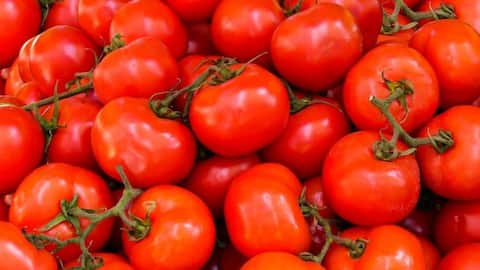Tomato juice is natural Salmonella fighter, confirms study
What's the story
A study conducted by Cornell University suggests that tomatoes and tomato juice may have the potential to combat bacterial infections in the gut, particularly targeting Salmonella enterica typhi, a bacteria responsible for causing typhoid fever. The research focused on identifying antimicrobial compounds within tomatoes and understanding their effectiveness against Salmonella. Let us understand what the research says further .
The study
Objective of the study
The research team, led by Cornell microbiologist Jeongmin Song, delved into the study of Salmonella, a group of bacteria known for causing intestinal infections, frequently associated with food poisoning. "Our main goal in this study was to find out if tomato and tomato juice can kill enteric pathogens, including Salmonella Typhi, and if so, what qualities they have that make them work," explains Song.
The experiment
Peptide power
When scientists exposed Salmonella typhi bacteria to freshly pulped tomato juice, something surprising happened, the bacteria were wiped out within just 24 hours. And interestingly, it wasn't because the juice was acidic. To figure out why this occurred, researchers looked at the tomato plant's genetic code, specifically the genes responsible for making small proteins called peptides that might have antimicrobial powers.
Crucial discovery
Future relevance
They found two peptides in tomatoes that could stop the growth of Salmonella typhi. What is even more impressive is that these peptides could also defeat a type of the bacteria that was resistant to ciprofloxacin, the main antibiotic used to treat typhoid fever. This understanding of natural antimicrobial defenses within fruits holds promise for strategies in combating bacterial infections.
Further
Non-lethal food poisoning
Finally, the scientists shaped models to represent the structure of their top two candidate peptides and simulated how they interacted with bacterial cell membranes. Consistent with the modeling predictions, these peptides caused the rupture of Salmonella typhi's cell membranes within a 45-minute timeframe. In subsequent experiments, the compounds demonstrated efficacy against Salmonella typhimurium, a non-typhoidal strain known for causing non-lethal food poisoning.
Conclusion
Well-rounded diet
Since these findings originate from cell experiments, it is crucial not to view them as approval to indulge in excessive amounts of tomato juice. The research underscores the significance of incorporating tomatoes into a balanced diet along with a variety of fruits and vegetables. In addition to this, it is essential to follow proper food hygiene practices when preparing these foods.
